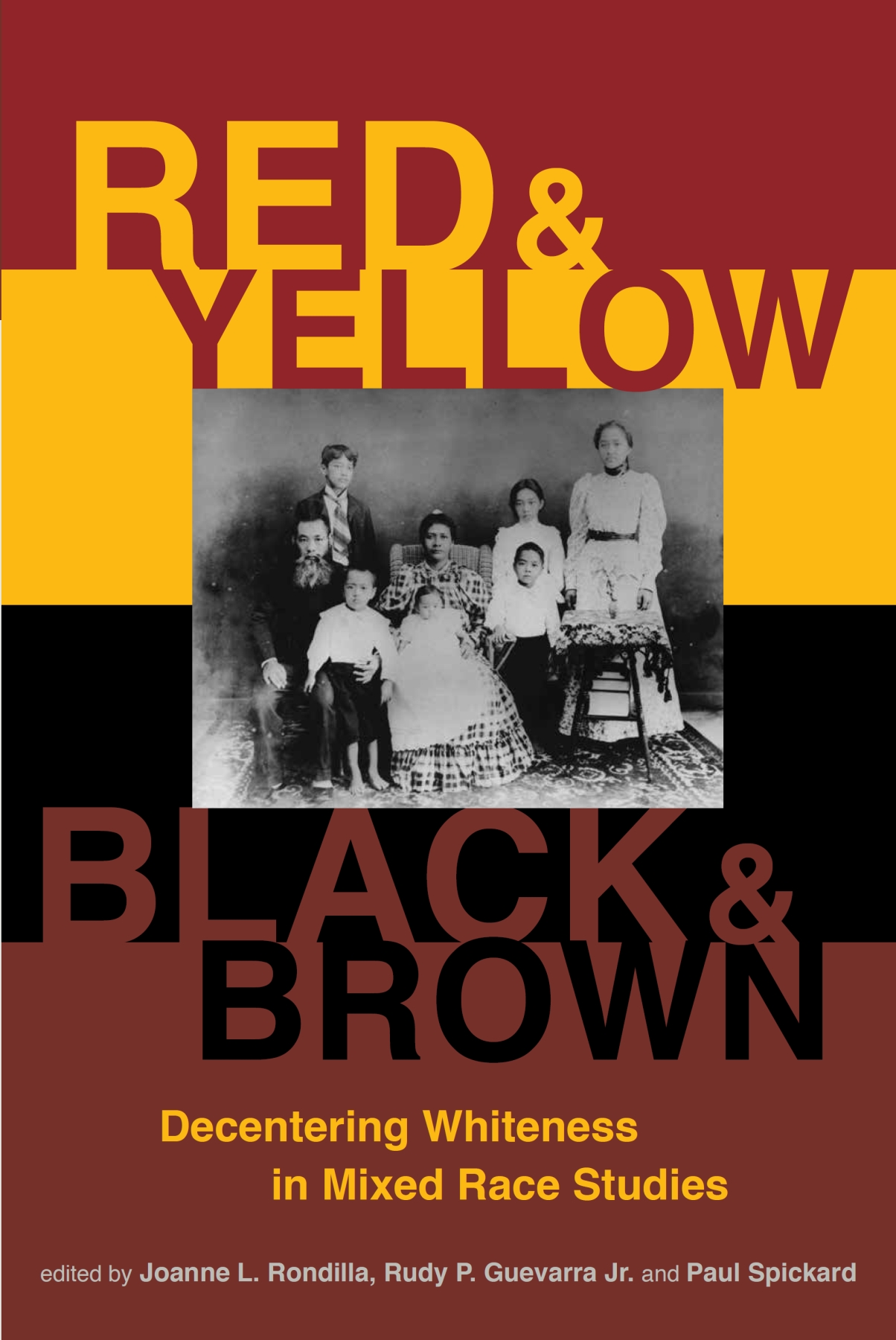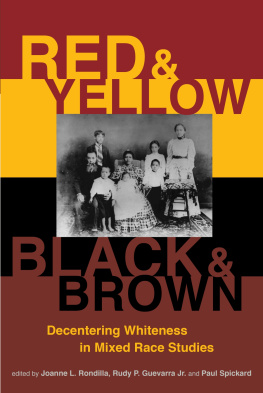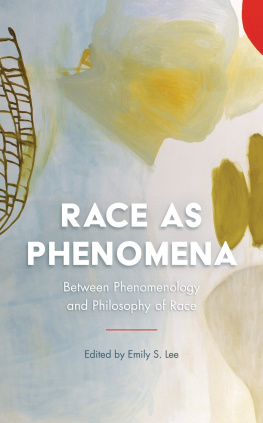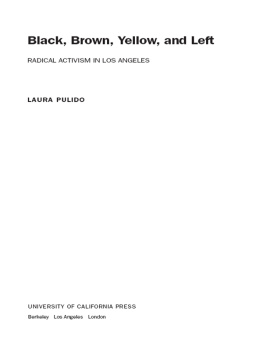
Red and Yellow, Black and Brown
Red and Yellow, Black and Brown
Decentering Whiteness in Mixed Race Studies
Edited by Joanne L. Rondilla, Rudy P. Guevarra Jr., and Paul Spickard

Rutgers University Press
New Brunswick, Camden, and Newark, New Jersey, and London
Cataloging-in-Publication data is available from the Library of Congress
978-0-8135-8730-1 (Book/Paperback)
978-0-8135-8731-8 (Book/cloth)
978-0-8135-8732-5 (Epub)
978-0-8135-8733-2 (Web PDF)
A British Cataloging-in-Publication record for this book is available from the British Library.
This collection copyright 2017 by Rutgers, The State University
Individual chapters copyright 2017 in the names of their authors
All rights reserved
No part of this book may be reproduced or utilized in any form or by any means, electronic or mechanical, or by any information storage and retrieval system, without written permission from the publisher. Please contact Rutgers University Press, 106 Somerset Street, New Brunswick, NJ 08901. The only exception to this prohibition is fair use as defined by U.S. copyright law.
www.rutgersuniversitypress.org
In loving memory of Angela and Rudy Guevarra
For Jose Ureta, whose thirst for knowledge inspires
To Anna
Contents
Paul Spickard, Rudy P. Guevarra Jr., and Joanne L. Rondilla
Velina Hasu Houston
Janet C. Mendoza Stickmon
Vernica Castillo-Muoz
Jessica Vasquez-Tokos
Cristina M. Ortiz
Ingrid Dineen-Wimberly
Rebecca Romo
Maharaj Raju Desai
Kaori Mori Want
Lily Anne Y. Welty Tamai
Terence Keel
Nitasha Tamar Sharma
Introduction
About Mixed Race, Not about Whiteness
Paul Spickard, Rudy P. Guevarra Jr., and Joanne L. Rondilla
Hines Ward was born in Seoul and came to the United States at the age of one. He grew up for a time as a Black boy in America, living in his early years with his father in Georgia and Louisiana. But he also had a Korean immigrant mother who was his sole day-to-day parent from the age of seven. As a boy in the American South, Hines felt ashamed of his mother:
I was almost embarrassed to talk about my own upbringing. To me, it was tough. It was never like the upbringing my friends had. At first, I was embarrassed that I had a Korean mom. I was embarrassed that my friends all had to take off their shoes before coming into my house. It was tough when my mom spoke broken English to my friends and their parents and people couldnt understand what she was saying or she couldnt understand what they were saying.... I remember one day I got in trouble at school. The principal called my mom, and my mom told the school that she would be right there. My mom walked straight into my classroom, all maybe 4-foot-10 of her, and she paddled me right in front of all my
In time, Hines came to appreciate the Korean-style upbringing that his mother provided.
My mom is my hero. She is the reason why I am who I am today. When other kids were doing all the wrong things, I was doing all the right things because my mom wouldnt have it any other way. She taught me to never quit on anything in life. She taught me the value of hard work, sacrifice and perseverance. Although she is a little woman, she ruled our house with a big presence. She is my rock.... I will always love, respect and honor my mom. She left everything she knew, that she called home in South Korea to come to a foreign country where she didnt even speak the language to give me a better life. So she sacrificed her entire life, relationships, worked three jobs, kept the house, and took care of me, so that I wouldnt have to suffer or experience the discrimination that she suffered in Korea.
Now a father himself, Hines Ward values the Korean upbringing: I have one son, and.... My philosophy on parenting is similar to what my mom taught me. I will teach my son to be tough, hard working, never quit, stay humble, no matter what. I will teach him the importance of self-sacrifice. I guess you could say I will teach my son the Korean way when it comes to discipline and education. It worked well for me. And Im sure it will work well for him. I will always show him that I love him by being there for him as he grows up.
Still later, Hines and Kim Young came to terms with Korea. Kim Young had taken her baby to America because of anti-Black and antiforeign discrimination she and Hines had experienced in Korea. But after Ward won the Super Bowl MVP trophy, he received an unexpected outpouring of praise from Koreans. Some of this may have been a manifestation of what Cynthia Nakashima calls the claim-us-if-were-famous syndromemixed race people of conspicuous achievement being acknowledged by racial communities that would have ignored them if they were less accomplished. But the Korean wave of appreciation for Hines Ward in 2006 and after also derived from his display of Korean values.
I didnt really associate with any Korean people growing up because of how my mom was treated in her own country. So when I won the Super Bowl XL MVP, thats when I heard that Korean people were calling out my name and cheering me on. I was really confused and shocked at this.... Everyone from little kids to the mayor of Seoul to the president of the country came out to thank me. And all I could think of was, Thank me for what? Then I was told... that the entire country of Korea was very proud of me, as a Korean, for the way I accepted the Super Bowl MVP trophy. He said when I dedicated it and all I had accomplished to my mom, the entire country of South Korea cheered because of the humility and gratitude I gave to my mom, the parent who raised me.... He said that I brought the entire nation back to the days when kids would show complete respect and honor to their parents. And for that, he thanked me. I was really humbled by what he said. I was beginning to see how my Korean heritage and culture saw things. And I began to start feeling pride in my Korean side.
Hines Ward is a Black American, but he is also a Korean American. It is an open question whether Wards athletic achievements owe more to the size, speed, and coordination some may think he inherited from his father, or to the incredible work ethic he undoubtedly learned from his mother. More important for the purposes of this book is the identity journey that Hines Ward has taken, from being a Black American man in a highly visible professional position, to marking himself as also a Korean American immigrant with ongoing ties to the land of his birth. He is a complicated guy.
Ariana Miyamoto is complicated too. Born in Sasebo, Japan, to a Japanese mother and a Black American father who soon returned to the United States, she grew up experiencing discrimination and abuse from other Japanese people. There was pretty much a spasmodic vomit of racial abuse heaped upon me, said the twenty-year-old. I was called n****r by some of my peers. Some of them threw trash and even a blackboard duster at me. Im Japanese through and through, but in Japan if you look foreign you are often not accepted as Japanese. But I am Japanese100 percent. Japanese is Miyamotos first and most fluent language, although she does speak English and attended high school for two years in Arkansas while getting to know her fathers family. She holds a fifth-level degree in Japanese calligraphy, a high level of mastery.
Although Japan thinks of itself as a very homogeneous country, lots of models and actors these days are
Next page





